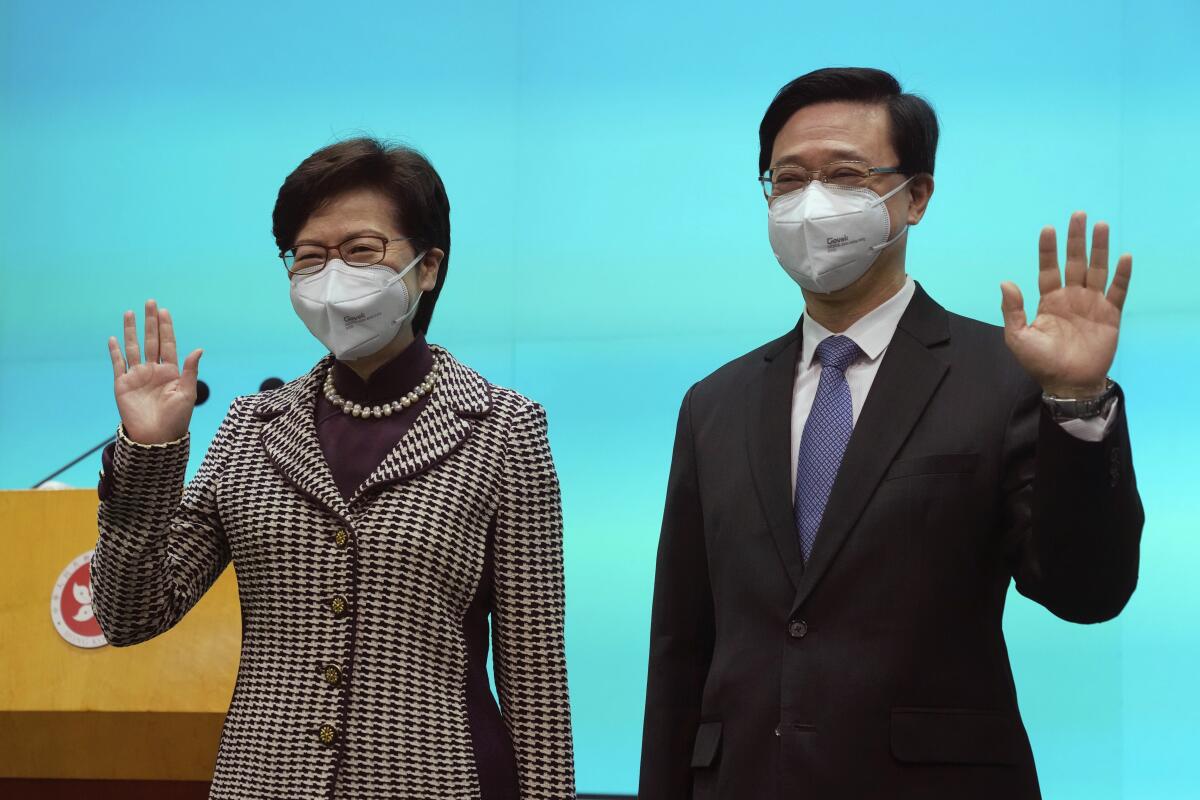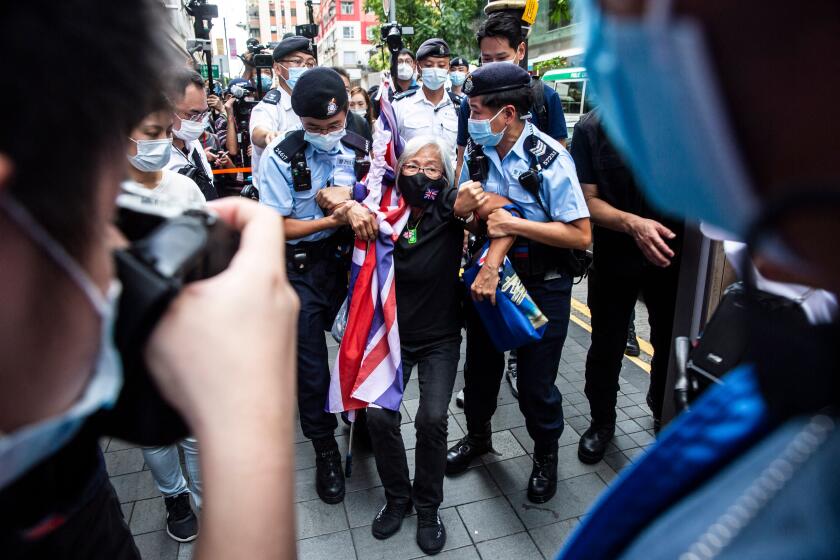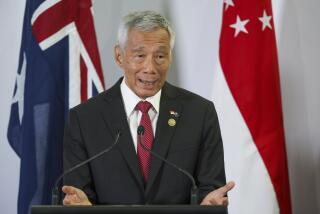An ex-security chief is taking the helm in Hong Kong. What lies ahead for the city?

- Share via
HONG KONG — There was little doubt about John Lee’s election as Hong Kong’s next leader.
The city’s former security chief received more than 99% of the vote from a committee stacked with mostly pro-Beijing members. He was the sole candidate in Sunday’s vote.
Lee will take over as chief executive of the territory from Carrie Lam on July 1, the 25th anniversary of Hong Kong’s 1997 handover from Britain to China. Lam leaves after five tumultuous years that spanned pro-democracy protests in 2019, a crackdown that snuffed out virtually all dissent and Hong Kong’s worst coronavirus outbreak, which has killed more than 9,000 people this year.
Who is John Lee?
Lee, 64, spent more than three decades in the police force before he was appointed undersecretary of Hong Kong’s security bureau in 2012. He was promoted to security minister in 2017 in Lam’s government. He was a key figure in pushing for a proposed extradition bill in 2019 that would’ve sent Hong Kong suspects to mainland China, where courts operate under the ruling Communist Party.
But the bill sparked massive anti-government protests over fears that Beijing was encroaching on Hong Kong’s autonomy, and soon the demonstrations over it morphed into calls for wider democratic rights, including universal suffrage. The government backtracked on the bill, but under Lee, police unleashed a heavy response that included the use of tear gas and rubber bullets against protesters as well as mass arrests.
Thousands of people from Hong Kong are fleeing increasing Chinese control over their lives and moving to Britain, which ruled the city for 156 years.
The following year, in 2020, Beijing imposed a sweeping national security law on Hong Kong, with Lee as its main supporter and enforcer. The legislation, which outlaws secession, subversion, terrorism and collusion with foreign forces in the city’s affairs, was used to clear streets of protesters, silence government opponents and crack down on independent media.
The same year, Lee, Lam and other Chinese and Hong Kong officials were sanctioned by the U.S. “for being involved in coercing, arresting, detaining, or imprisoning individuals under the authority of the National Security Law, as well as being involved in its development, adoption, or implementation.”
In June 2021, Lee was promoted to chief secretary for administration, in effect becoming the No. 2 official in Hong Kong.
He resigned from his post in April to stand in the leadership contest. During his election campaign, YouTube terminated Lee’s channel in compliance with U.S. sanctions — a move that Lee described as “bullying” and “unreasonable.”
What does his election mean for Hong Kong?
Experts have said that Beijing’s endorsement of Lee signals the central government’s desire for someone who can reliably ensure that its authority in Hong Kong is never questioned again.
The city was promised freedoms not found in mainland China when the British handed it over in 1997. But such Western-style liberties, including freedom of press and assembly, have been seriously eroded with the implementation of the national security law. More than 150 people, most of them pro-democracy supporters, have been arrested, and many others fled abroad or keep quiet.
When I was a young man in the 1970s, I joined hundreds of thousands of desperate Chinese to swim miles across the sea to Hong Kong, our beacon of freedom.
Lee has also pledged to enact local legislation to protect against security threats, known as Article 23 of Hong Kong’s mini-constitution, the Basic Law. Previous attempts to pass the bill have failed because of strong local opposition. Article 23 stipulates that the city shall enact its own laws to prohibit “any act of treason, secession, sedition, subversion against the Central People’s Government,” as well as “theft of state secrets.”
How did the election process change?
This year’s vote for Hong Kong’s chief executive is the first since the electoral system was changed last year to ensure that only “patriots” are allowed to run for office.
The crackdown on dissent, coupled with the electoral reform, all but eliminates pro-democracy candidates for the legislature or the top post. Under the new system, candidates must be vetted by a committee that determines if they are suitable or patriotic enough.
Under the new electoral rules, Lee was the only candidate who received backing by Beijing. Several people, including a movie producer, had expressed interest in running but did not submit their names during the nomination process.
More to Read
Sign up for Essential California
The most important California stories and recommendations in your inbox every morning.
You may occasionally receive promotional content from the Los Angeles Times.











